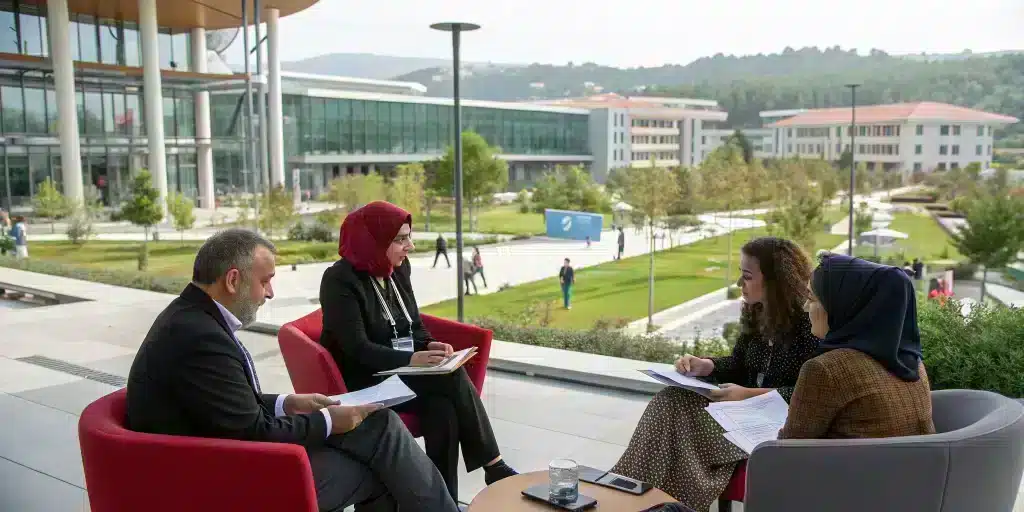Working in Academia in Turkiye After Your PhD
Academic Career Structure in Turkiye
Most Turkish universities, whether public or private, follow a hierarchical academic ranking system for post-PhD careers. The common ranks are:
Research Assistant
Role: Often the starting point during doctoral studies or immediately after, focusing on research and limited teaching responsibilities.
Typical Duties: Assisting faculty with research projects, contributing to academic papers, and engaging in educational support.
Lecturer/Instructor
Role: Focused mainly on undergraduate teaching, sometimes without a research requirement.
Typical Duties: Teaching courses, preparing course materials, and assessing students.
Assistant Professor (Dr. Öğretim Üyesi)
Role: The typical entry-level faculty position after earning a PhD. Assistant professors engage in independent research, teach undergraduate and graduate courses, and supervise theses.
Path to Promotion: Demonstrating research productivity, teaching effectiveness, and community service is crucial for advancement.
Associate Professor (Doçent)
Role: Achieved after a national-level qualification process that includes research publications, teaching experience, and sometimes an additional exam. Associate professors take on larger research projects and increased teaching duties.
Responsibilities: Leading research teams, mentoring junior faculty, and participating in departmental governance.
Professor (Profesör)
Role: The highest academic rank. Professors lead research groups, supervise doctoral candidates, and often hold administrative roles within their departments or faculties.
Key Contributions: Professors are expected to contribute significantly to their field of study through published research and leadership in academic programs.
Pathways to Academic Employment
– Open Faculty Positions: Candidates can apply for open faculty positions at universities across Turkiye. Appointments are competitive and often require a strong research record, published articles, and demonstrable teaching ability.
– Promotion Through Ranks: Promotion is based on national guidelines as well as university-specific criteria. This typically includes research output, project leadership, teaching evaluations, and service to the academic community.
– Opportunities for Foreign Nationals: Foreign nationals with a PhD are also eligible to apply for academic roles in Turkiye, especially as Turkish universities continue to internationalize their staff and student bodies. For instance, universities like Bahcesehir University and Medipol University are known for their international programs and welcoming application process for foreign graduates.
Research and Teaching Opportunities
Turkish universities are active in both research and teaching. Many institutions offer postdoctoral fellowships and research positions, providing opportunities to continue academic work after the PhD.
English-Medium Programs
Increasing Availability: English-medium programs are increasingly common in Turkish universities, creating roles for non-Turkish speakers. Institutions like Aydin University and Ozyegin University are noteworthy for their extensive courses offered in English.
Funding and Collaboration
Access to Research Funding: Academic staff can access national and international research funding, which supports innovative research projects and collaborations with other universities.
Inter-University Collaborations: Partnerships with universities both within and outside of Turkiye are promoted to enhance research quality and broaden academic reputation.
Key Considerations
Planning and Preparation
– Research Agenda: Academic appointments in Turkiye require careful planning of your research agenda and strategic publication in recognized journals. This is crucial for maintaining competitiveness in the academic job market.
– Teaching and Research Balance: Many positions expect applicants to contribute meaningfully to both teaching and research from the onset.
Networking and Community Engagement
– Building Connections: Networking within Turkish academia, participation in national conferences, and collaboration with established scholars can significantly strengthen your prospects for advancement. Engaging with academic events organized by institutions such as Uskudar University can provide valuable networking opportunities.
Summary
A PhD opens several doors in Turkish academia, with an established pathway to career progression and opportunities for both local and international scholars. Success depends on research achievement, teaching capability, and active engagement with the academic community.
For more details on academic careers, faculty requirements, and university profiles, consult the relevant university and major program pages on Study in Turkiye.
Take the Next Step with Study in Turkiye
Explore further opportunities and resources to advance your academic career in Turkiye. Whether you are looking to study, apply, or gather more information, we are here to guide you.

